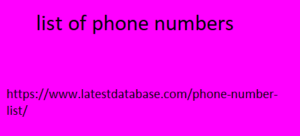Post by farjanapakhi on Feb 19, 2024 8:04:59 GMT
However, in recent years, as smartphones have become more widespread, flea market apps like Mercari have become popular. However, "things" are not the only objects traded in CtoC. The details are explained below. What is the sharing economy? “Sharing economy” is a term closely related to CtoC. What is the sharing economy? A business model in which goods, places, skills, etc. are bought, sold, rented, etc. between "individuals and individuals" or "individuals and companies" via the Internet. Sharing economy explained The sharing economy is emerging in a variety of fields as IT becomes more widespread and sophisticated. For example, the parking reservation service ` `akippa' ' allows you to rent out a space.
Vacant spaces in private homes, condominiums, business list of phone numbers offices, etc. can be rented out as parking lots, and owners can receive rewards based on users' usage. Benefits for users include ``being able to find a parking lot nearby from your current location'' and ``being able to park your car at a low price.'' This way of thinking and consumption style of sharing is spreading in Japan as well. Sharing economy also contributes to SDGs In the first place, the sharing economy is becoming more active due in part to the influence of the SDGs (SDGs). What are SDGs? An abbreviation for "Sustainable Development Goals," which is generally translated as "Sustainable Development Goals." Adopted at the United Nations Summit in September 2015, these are international goals aimed at creating a sustainable and better world by 2030. The SDGs set ``17 goals,'' and for example, the 12th goal is ``Responsible production and consumption.'' Sustainable Development Goals Source: Ministry of Foreign Affairs: SDGs Action Platform The purpose of ``Responsible Production and Responsible Consumption'' is primarily to ensure ``sustainable production and consumption patterns.'' If companies and individuals become proactive about recycling and reusing, we can reduce garbage from society little by little.

The government is also promoting the sharing economy as it is believed to be able to contribute in a variety of other ways, such as ``providing evacuation sites using private lodging facilities during disasters'' and ``realizing regional revitalization.'' Difference from subscription A word that is often confused with the sharing economy is "subscription." What is a subscription? ``regular purchase'' or ``periodic subscription,'' in which the user does not purchase (own) a product or service, but instead pays a fee for a certain period of use. Both are similar in that the user does not own the product or service, but with a subscription, you are bound by the period of use. On the other hand, the basic feature of the sharing economy is that users can use it only when they want. Difference between subscription and sharing economy Services that are convenient to use are attractive to users. This is also one of the reasons why sharing economy services have become popular.
Vacant spaces in private homes, condominiums, business list of phone numbers offices, etc. can be rented out as parking lots, and owners can receive rewards based on users' usage. Benefits for users include ``being able to find a parking lot nearby from your current location'' and ``being able to park your car at a low price.'' This way of thinking and consumption style of sharing is spreading in Japan as well. Sharing economy also contributes to SDGs In the first place, the sharing economy is becoming more active due in part to the influence of the SDGs (SDGs). What are SDGs? An abbreviation for "Sustainable Development Goals," which is generally translated as "Sustainable Development Goals." Adopted at the United Nations Summit in September 2015, these are international goals aimed at creating a sustainable and better world by 2030. The SDGs set ``17 goals,'' and for example, the 12th goal is ``Responsible production and consumption.'' Sustainable Development Goals Source: Ministry of Foreign Affairs: SDGs Action Platform The purpose of ``Responsible Production and Responsible Consumption'' is primarily to ensure ``sustainable production and consumption patterns.'' If companies and individuals become proactive about recycling and reusing, we can reduce garbage from society little by little.

The government is also promoting the sharing economy as it is believed to be able to contribute in a variety of other ways, such as ``providing evacuation sites using private lodging facilities during disasters'' and ``realizing regional revitalization.'' Difference from subscription A word that is often confused with the sharing economy is "subscription." What is a subscription? ``regular purchase'' or ``periodic subscription,'' in which the user does not purchase (own) a product or service, but instead pays a fee for a certain period of use. Both are similar in that the user does not own the product or service, but with a subscription, you are bound by the period of use. On the other hand, the basic feature of the sharing economy is that users can use it only when they want. Difference between subscription and sharing economy Services that are convenient to use are attractive to users. This is also one of the reasons why sharing economy services have become popular.

